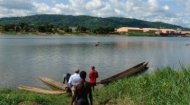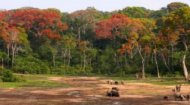CAR NewsExplore the latest Central African Republic news and current events, the current state of press freedom in CAR, including government influence, legal threats, and the role of independent media. The main CAR news headlines are below however you can also read news from each African country by using the drop-down menu. |
CAR News |
CAR News |
CAR News | CAR News |
For information, videos and photos of the Central African Republic check out our CAR profile pages.
More >
|
|

|
The news media landscape in the Central African Republic (CAR) operates in a state of perpetual fragility, where constitutional guarantees of press freedom are consistently undermined by political instability and insecurity. While the legal framework superficially enshrines the right of journalists to report freely, the daily reality is one shaped by significant constraints, making independent reporting a hazardous profession, blurring the lines between permissible commentary and punishable dissent. Journalists in the CAR frequently contend with targeted harassment, arbitrary arrests, and threats of violence, particularly when covering sensitive topics such as corruption, conflict, or the activities of foreign partners. Instances of state-orchestrated intimidation are common; specific cases include short-term detentions and the physical assault of reporters attempting to interview opposition figures or victims of violence. Furthermore, the authorities have demonstrated a willingness to utilise media shutdowns as a tool for control, effectively silencing critical voices during periods of political tension. The dynamics of information control are further complicated by the stark contrast between state-owned outlets, such as Radio Centrafrique, which largely function as government mouthpieces, and the handful of privately owned and community media outlets attempting to maintain independence. Independent broadcasters, notably Radio Ndeke Luka, often walk a tightrope, providing crucial information to the populace while navigating persistent pressure and threats to their operational capacity. This governmental control extends into the digital realm, where the authorities occasionally resort to internet blackouts or the deliberate throttling of connection speeds to disrupt the dissemination of information, particularly outside the capital, Bangui. Though sophisticated digital surveillance is less pervasive than in some neighbouring states, regulations targeting social media are increasingly used to justify the arrest of individuals deemed to be spreading "false news." When comparing the CAR environment to its immediate region, the challenges faced by its journalists stand out. While few countries in Central Africa boast impeccable records on press freedom—Cameroon and Chad, for example, have their own issues with governmental oversight and harassment—the high level of physical danger and the frequent use of extra-legal tools to suppress reporting place the CAR among the most difficult environments for media practitioners on the continent. |







